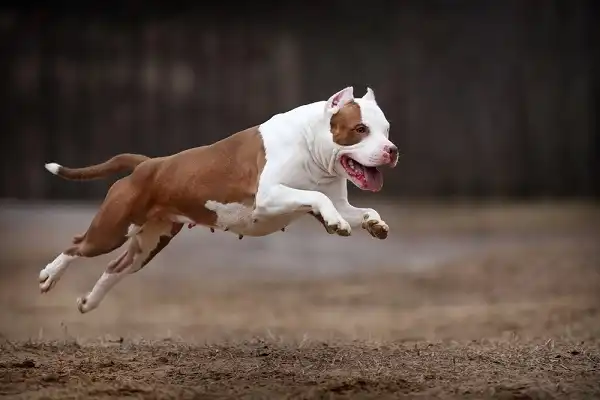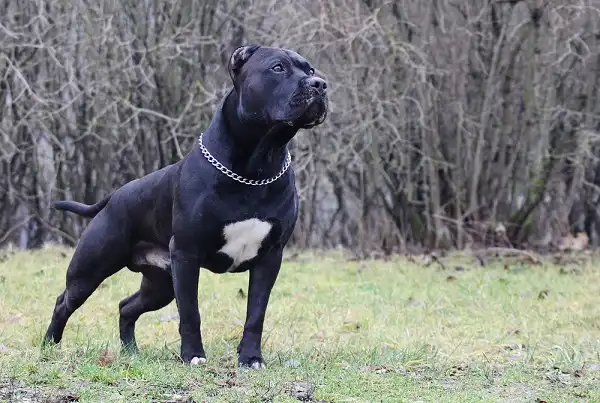Despite their rough reputation, pit bulls are actually loyal and loving companions known for their courage and unconditional love. As a breed, they have been misunderstood by many; however, those who spend the time to get to know them to realize that this breed is not only friendly but also highly intelligent and easily trainable. With proper training and socialization provided at an early age, Pit Bulls make excellent family pets who will welcome you with open paws!

Pit Bull Description
Pit Bulls, also known as American Pit Bull Terriers, originated in the United States in the early 1800s. They were initially bred for bull-baiting and fighting, but since those practices became illegal, the breed has evolved into loyal and loving companions. Pit Bulls are muscular and athletic dogs, with broad heads and strong jaws. They have a short, sleek coat that is easy to maintain and comes in a variety of colors, including black, white, fawn, blue, and brindle. Despite their strong appearance, they are actually very gentle and affectionate with their human family. One thing that sets Pit Bulls apart from other breeds is their incredible loyalty. They will do anything to protect and please their loved ones, making them excellent guard dogs as well. Their high intelligence and eagerness to please also make them highly trainable, especially if you start training them at an early age.
Pit Bull Habitat
Pit Bulls thrive in a variety of habitats as long as they receive proper care and attention. They do well in urban settings where they can receive daily exercise, but they are also adaptable to rural environments where they can roam freely. Pit Bulls have a high energy level and require plenty of physical activity and mental stimulation, so a spacious and secure yard or regular access to a dog park is beneficial for their overall well-being. As muscular dogs with short coats, Pit Bulls are sensitive to temperature changes and should not be left outside for extended periods in extreme weather conditions. They also enjoy spending time indoors with their human family but require an area in the home designated specifically for them to rest and call their own. In addition to physical habitat, it is important to establish a consistent routine and provide daily mental stimulation for Pit Bulls to prevent boredom and destructive behavior. Interactive toys, games, and training exercises are all effective ways to keep these intelligent and curious companions engaged and happy.
Pit Bull Diet
Pit Bulls are known for their muscular build and high energy levels. As such, their diet should be carefully monitored to ensure they receive the necessary nutrients to maintain their health and vitality. A well-balanced diet is essential for their growth and development, as well as their overall well-being. Protein is particularly important for Pit Bulls, as it helps to build and repair their muscles. A diet high in animal-based protein sources such as chicken, fish, and beef is recommended. However, it is important to note that some Pit Bulls may have allergies to certain animal proteins, so it is essential to observe any adverse reactions and adjust their diet accordingly. Carbohydrates are also an essential part of a Pit Bull’s diet, as they provide energy for their high activity levels. Whole grains such as brown rice and oatmeal, as well as fruits and vegetables, can provide the necessary carbohydrates, fiber, and vitamins for a balanced diet.

Pit Bull Size
Pit Bulls are a medium to large breed of dog, typically weighing between 30 and 90 pounds and standing between 18 and 22 inches tall. However, there can be some variation in size based on breeding and genetics. As with any breed of dog, it is important to consider the size of a Pit Bull when selecting a living space or exercise routine. They require a spacious and secure yard or regular access to a dog park to burn off their high energy levels. It is also important to note that Pit Bulls are a banned breed in certain areas and may not be allowed in rental properties or housing developments. It is recommended to research breed-specific legislation in your area before bringing a Pit Bull into your home.
Pit Bull Lifespan
The lifespan of a Pit Bull can vary based on various factors such as genetics, diet, exercise, and overall health. On average, Pit Bulls can live for 12 to 14 years, but some can live up to 16 years or more with proper care and attention. To ensure a Pit Bull’s longevity, it is crucial to provide them with a well-balanced diet with high-quality protein, essential nutrients, and healthy carbohydrates. In addition, regular exercise and veterinary check-ups are necessary to maintain their physical and mental health. It is also important to note that Pit Bulls, like all breeds, are susceptible to various health issues such as hip dysplasia, allergies, and skin infections. Regular veterinary check-ups can help detect these issues early and allow for proper treatment.
Pit Bull Behavior
Pit Bull behavior is often misunderstood due to negative stereotypes and misconceptions surrounding the breed. However, when raised and trained properly, pit bulls can be loving, loyal, and affectionate companions. It is important to note that like any breed, Pit Bulls can exhibit aggressive behavior if they are mistreated or not socialized properly. However, studies have shown that there is no evidence to support the idea that pit bulls are inherently more aggressive than other breeds. One of the most important factors in Pit Bull behavior is socialization. Proper socialization from a young age can help to prevent any aggressive tendencies and ensure that Pit Bulls are friendly and well-behaved around people and other animals. Pit Bulls are also very intelligent, and they require mental stimulation to prevent boredom and destructive behavior. They can be trained in a variety of tasks, including obedience, agility, and even therapy work.

Pit Bull Speed
Pit Bulls are athletic and powerful dogs that have a reputation for incredible speed. Their muscular builds, high endurance, and natural agility make them excellent candidates for sports and competitions such as agility, flyball and lure coursing. Pit bulls’ speed can vary depending on their physical condition, age, and training. On average, Pit Bulls can run at speeds of up to 30 mph (48 km/h), which is faster than the average of most dog breeds. In fact, Pit Bulls are considered one of the fastest dog breeds in the world. Their impressive speed is the result of their muscular legs and powerful hindquarters, which enable them to run with incredible speed and agility. Additionally, their short and smooth coat provides minimal air resistance, allowing them to move faster and with greater ease. It is important to note that while Pit Bulls are known for their speed and athleticism, they are not suited for long-distance running. Their muscular builds are more suitable for short and intense bursts of activity, rather than prolonged endurance activities.
Pit Bull Hunting
Pit Bulls have a reputation for being excellent hunters. They were originally bred for blood sports such as bull-baiting and bear-baiting, but their natural hunting instincts have also made them popular in activities such as wild hog hunting, squirrel hunting, and even deer hunting. In addition to their physical abilities, Pit Bulls are also highly intelligent and trainable. They have a strong desire to please their owners and can be taught a wide variety of hunting skills, including tracking, pointing, flushing, and retrieving. Pit Bulls are also highly adaptable and can excel in a variety of hunting environments, from dense forests to open fields. Their short, smooth coat provides minimal interference when navigating through brush and their natural agility allows them to quickly change direction and follow the scent of their prey. However, it is important to note that hunting with Pit Bulls requires proper training and socialization. They must be taught to differentiate between their prey and other animals, as well as to obey commands even in the heat of the chase.

Conclusion
Pit Bulls are an incredibly versatile and athletic breed of dog, renowned for their speed, strength, agility, and hunting skills. Their muscles and powerful jaws enable them to take down larger prey with ease and their short coat minimizes air resistance while running. With proper training and conditioning, they can reach impressive speeds. In addition, they have a strong desire to please their owners and can be taught a wide variety of hunting skills. However, it is important to remember that hunting with Pit Bulls requires proper training and socialization as well as a safe and ethical approach.
Frequently Asked Question

